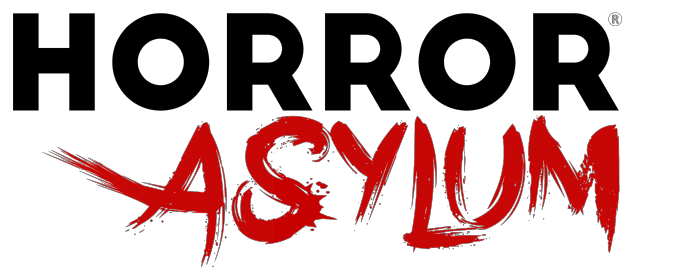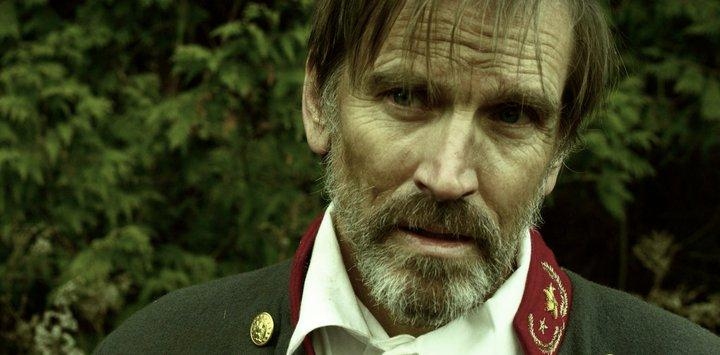Face of a thousand psychopaths, sadistic carnies and serial killers, horror veteran Bill Moseley’s affinity with the dark side of the silver screen has long been nothing short of notorious. But despite being expertly versed in playing the legendary likes of The Texas Chainsaw Massacre 2’s Chop Top and Rob Zombie’s iconic Otis Driftwood, 2012’s Exit Humanity sees the genre heavyweight getting under the skin of an altogether different breed of villain. As the zombie epic’s anticipated DVD release draws near, Faye Coulman braves an audience with the talented and unexpectedly affable Mr Moseley.
Hi Bill, how are
you?
I’m doing well, thanks. It’s a sunny day here in Los Angeles and I’m
feeling good.
So, what was it that first
attracted you to the script of Exit Humanity?
It was certainly the very complex character of General Williams. He’s a
Civil War general on the losing side which is very galling and, even
though the war is over, he hasn’t quite stopped fighting yet. He’s like a
big frog in a small pond, insofar as everybody is either dead or
zombified, but he’s still fighting the Civil War which was lost years
earlier and trying to get the South to finally prevail by raising an army
of zombies.
You’re best known for playing
murderous outlaws and outsiders, whereas in this movie, you’re a military
leader who’s completely lost his grip on sanity. Do you think this total
departure from order and discipline makes for a particularly disturbing
breed of villain?
Absolutely. I think that sense of discipline and the fact that General
Williams still demands military order – even though his world has been
reduced to a series of underground tunnels where he imprisons normal human
beings – is highly disturbing. In terms of that spectrum of madness, a
character I channelled in particular was Marlon Brando’s Colonel Kurtz in
Apocalypse Now. Basically, you’re the only authority figure so you are god
in a small way because you’re making these life and death decisions. You
know, you’re it and you find there is no higher sense of authority than
your sense of honour and duty and the memories of the South and the
ambition to lead everyone to victory. And it’s interesting that, every
once in a while, you can see there is something rational left in him when
the excitement wears off and the pain becomes unbearable.
I understand this is John
Geddes’ debut film. How did working with him compare with more established
directors?
I’ve worked on a lot of independent features, a lot of first time
directors, and what was very satisfying about working with John – above
and beyond the great script he wrote and the wonderful art direction and
being up in Ontario shooting the movie – was the fact it was a
collaborative process. Sometimes, first time directors are so wrapped up
in wanting to be the captain of the ship that they don’t want to hear
anything from their actors. That’s not a bad idea exactly, but it’s like,
my way or the highway, that kind of authoritarian approach and I’ve
certainly worked well with directors like that in the past. But for me
personally, it’s a lot more fun when we’re collaborative.
As an actor, you’re adjusting to this new world in
order to try and make it real and there are things between the script and
what is being said in the moment that are considerably different. So it
makes sense to report back and say things like “What about this? This
feels a little more real and natural.” It’s fun for an actor to work with
a director who’ll actually allow you to raise those questions and just
goes yes or no and makes a bloodless decision based on whether it suits
the production or not. Working with John was very much like that. We had
an opening scene where my henchmen and I come upon Edward Young sitting
around a campfire. Several weeks before I got up to Ontario, I had tried
to make that scene work, but the way it was worded made it hard for me to
work through and I got onto the set and mentioned it to John and said,
“This is the one scene where I’ve been having trouble.” And what he was
able to do was to say, “Let’s just improv it and figure our way through it
in a way that’s comfortable to act.” So John and I worked on it, and when
I saw the finished scene I was really happy with the way it worked out. I
thought it was very natural, very comfortable and real, and it also made
me very grateful to John to have the confidence and also the leeway to try
out a different approach just to make sure that it worked.
As seen in Exit Humanity, what
do you think often makes horror and the western genre such a successful
mix?
When you add in the Civil War, it was such a carnage that the idea of dead
people walking around the woods isn’t so far removed from the reality of
that terrible era. It’s as not as if the Civil War needed any more
embellishment for its horror, but just adding in that supernatural element
in was very exciting. When you have that very western sense of duty and
honour, I think it ends up slowing everything down and you end up with a
movie that has a lot more scope and depth. What I appreciate about John’s
approach is that it ends up really taking time for the emotions to unfold,
for the narrative and scenes to unfold. For people who aren’t the
impatient, three-second cuts-type of viewers, I think it’s a wonderful
movie in terms of the grandeur of the setting and history.
I think that particular genre
mix also worked exceptionally well for you in The Devil’s Rejects.
Yeah, I love that. I think it’s no accident that, both in The Devil’s
Rejects and also in House Of 1000 Corpses, it’s kind of pre-cell phone,
and I’m all for telling a story without the interference of technology. It’s
so funny, because when you look back to the ’80s movies when cell phones
were so large and clunky, or you see an old Apple computer or something,
that immediately dates it too. And so I appreciate Rob’s approach and John
Geddes’ approach that you end up with a certain timelessness that isn’t
destroyed by obsolete technology.
Following the torture and
gorenography trends of recent years, do you think horror fans are, to an
extent, beginning to tire of this and seek out more original movies like
this one?
It’s possible, but for me it’s not so much the gore that bothers me, it’s
bad storytelling. So, as long as the story is good, you could have two or
so hours of some brutal surgery and I’d be happy with it as long as the
story was compelling. But the problem is that sometimes you end up getting
into gratuitous stuff which some people like – certainly the special
effects makeup artists because, for them, it’s all about out-goring and
out-grossing one another. I know a lot of special effects makeup people so
I’m always happy when they get jobs. But speaking of torture, I just did a
movie called The Tortured, so that certainly is kind of the central theme
of it. It’s about a family whose child was abducted by a paedophile and
brutally murdered, but they intercept the paedophile on his way to jail
and take him to a remote cabin and do to him what he did to their son, so
that’s more of a compelling story at least.
Also, I can say that one of my favourite movies is one
with plenty of gratuitous gore in it. I had been over in Poland where I’d
done a couple of movies, and when I returned from doing the second movie,
I saw Eli Roth’s Hostel, which I thought was wildly entertaining. I’d just
been in Eastern Europe where I’d seen a lot of the same landscapes and
cultural features so I could just imagine somebody grabbing a couple of
tourists and doing all kinds of horrible things to them for a price. So if
the story is good, I don’t really mind the gore and, having been in the
genre for so long, I’m pretty good at assessing it in terms of how good it
is, how imaginative it is. But I probably won’t be showing it to my
thirteen-year-old any time soon.
You’ve played many a psycho
and sinister character throughout your career. Precisely what is it that
draws you to the darker side of the human psyche?
Well, frankly, for an actor there’s some very juicy parts. Some of the
parts that I’ve been given have been really fun to play. And I would much
rather – and maybe it’s just my own psychological warp – play bad guys
than good guys because I seem to have a lot more emotional tools to play
the bad guys. I think you’d have to take a good look at my psychological
rap sheet though. *Laughs* Also, having played a character or two, I think
it all goes back to playing Chop Top in The Texas Chainsaw Massacre 2 back
in 1986. I think success breeds success. Because of Chop Top, that’s why
Rob Zombie hired me to play Otis Driftwood in House Of 1000 Corpses and
The Devil’s Rejects. Then you make friends in the genre, young filmmakers
see you and get excited and inspired by your performance and so they want
you to be a psycho in their movie. So by doing enough movies, you also
become a name on the DVD box so that ends up being helpful in terms of
financing your bills and it all kind of beautifully weaves together into
role after role.
I remember one time I was doing White Fang, a Disney
movie, up in Alaska in the early nineties. I was walking along the banks
of a river in Alaska near where we were shooting and I was playing the
henchman to an actor named James Remar. But it was so funny, I was just
openly opining and I said to him “I don’t know if I want to get
pigeonholed as a bad guy or a monster.” And I remember him looking at me
in a rather intimidating way and saying “You’d be lucky to be
pigeonholed.” I laughed because I thought, it’s really hard to get jobs
in the acting profession and, no matter what you do, you have to be fun to
work with and not be a pain in the butt. The fact that I get pigeonholed
in the horror genre makes me very happy though, because I love the genre,
I love the characters I play and I love the work.
Well, as a big fan of your
work, I’m personally very glad the horror genre was something you found
yourself “pigeonholed” into.
I’m a horror fan too so one of the things that I appreciate about the work
is getting to give back to the fans in the genre. I’ve watched a lot of
horror movies in my day and not all of them are the cream that rises to
the top and I also go to a bunch of horror conventions so I meet horror
fans all the time and they’re such a loyal and dedicated bunch. So I take
it personally in terms of not phoning it in or not being too cynical about
it. It’s what I do, it’s what I love to do and every time I try to do the
best I can because I appreciate a good performance as much as anybody.
“Thank you ever so much for taking part in this interview Bill.
And we wish you the very best of luck in the future.”

